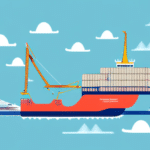Understanding FOB Costs: What You Need to Know
For businesses involved in international trade, the term FOB is commonly used to describe the costs and responsibilities associated with transporting goods from one location to another. FOB, which stands for Free On Board, is one of several incoterms that help define the responsibilities and liabilities of buyers and sellers during the transportation of goods.
What is FOB: A Brief Introduction
FOB refers to the point in the transport process where the seller’s responsibility ends and the buyer’s responsibility begins. Specifically, FOB refers to the point where goods are loaded onto a shipping vessel for transport. At this point, ownership of the goods and all risks associated with the transportation of the goods transfer from the seller to the buyer.
It is important to note that FOB is just one of several Incoterms (International Commercial Terms) that define the responsibilities of buyers and sellers in international trade. Other commonly used Incoterms include CIF (Cost, Insurance, and Freight) and EXW (Ex Works). It is crucial for both parties to clearly understand the chosen Incoterm and its implications before entering into a transaction to avoid any misunderstandings or disputes.
Types of FOB Agreements Explained
There are several different types of FOB agreements that buyers and sellers can enter into. These include FOB shipping point, FOB destination, and FOB vessel. Each of these agreements can have different implications for the costs and responsibilities associated with the transportation of goods.
- FOB Shipping Point: Ownership of the goods and risk of loss transfers to the buyer as soon as the goods are loaded onto the shipping vessel.
- FOB Destination: Ownership and risk of loss transfer to the buyer once the goods have arrived at their final destination.
- FOB Vessel: Ownership of the goods and risk of loss transfer to the buyer once the goods are loaded onto the vessel at the port of origin.
It is important for buyers and sellers to carefully consider which type of FOB agreement is most appropriate for their specific situation. For example, if the buyer is responsible for arranging transportation and wants to have more control over the shipping process, FOB shipping point may be the best option. On the other hand, if the seller is responsible for arranging transportation and wants to ensure that the goods arrive safely at their final destination, FOB destination may be the better choice.
In addition to the three main types of FOB agreements, there are also variations that can be used to further customize the terms of the agreement. For example, FOB origin with freight prepaid means that the seller is responsible for paying the shipping costs, while FOB origin with freight collect means that the buyer is responsible for paying the shipping costs. These variations can have a significant impact on the overall cost of the transaction, so it is important to carefully consider all options before entering into an FOB agreement.
Difference between FOB and CIF
Another common term in international trade is CIF, or Cost, Insurance, and Freight. CIF is similar to FOB, but it includes the cost of insurance and shipping in addition to the cost of the goods. In a CIF agreement, the seller is responsible for shipping the goods to the buyer’s destination and insuring them during transport until they arrive.
The main difference between FOB and CIF is that ownership and risk of loss transfer to the buyer at different points in the shipping process. In FOB agreements, ownership and risk of loss transfer to the buyer once the goods are loaded onto the shipping vessel. In CIF agreements, ownership and risk of loss transfer to the buyer once the goods have arrived at their final destination.
It is important for buyers and sellers to understand the differences between FOB and CIF agreements, as they can have significant implications for the cost and risk involved in international trade. For example, in an FOB agreement, the buyer may be responsible for arranging and paying for insurance and shipping, which can add to the overall cost of the transaction. On the other hand, in a CIF agreement, the seller may have more control over the shipping process and may be able to negotiate better rates for insurance and shipping, which can benefit both parties.
Advantages of Using FOB Contracts for International Trade
FOB contracts offer several advantages for businesses involved in international trade. For one, FOB contracts can help buyers and sellers agree on a specific point in the transportation process where ownership and responsibility transfer. This can help to reduce disputes and confusion about who is responsible for what during the shipping process.
Additionally, FOB contracts can help businesses to more accurately calculate the total cost of shipping goods from one location to another. By understanding when ownership and liability transfer, businesses can more accurately estimate the total cost of shipping goods and factor these costs into their pricing models.
Another advantage of using FOB contracts is that they can provide greater flexibility in terms of shipping options. With FOB contracts, buyers and sellers can negotiate the specific mode of transportation that will be used to ship the goods. This can include options such as air freight, sea freight, or ground transportation. By having more control over the shipping process, businesses can choose the most cost-effective and efficient shipping method for their needs.
How to Calculate FOB Costs: A Step-by-Step Guide
Calculating FOB costs requires understanding the total cost of shipping goods from the seller’s location to the buyer’s destination. To calculate FOB costs, businesses should consider the following:
- Cost of goods
- Freight charges
- Insurance costs
- Loading and handling charges
By adding these costs together, businesses can determine the total cost of shipping goods under an FOB agreement.
It is important to note that FOB costs only cover the transportation of goods up to the shipping port or terminal. Any costs incurred after the goods have been loaded onto the shipping vessel, such as unloading and transportation to the final destination, are the responsibility of the buyer.
Additionally, businesses should consider the terms of the FOB agreement, as they can vary depending on the location and type of goods being shipped. For example, FOB origin means that the buyer is responsible for all costs and risks associated with the shipment once it leaves the seller’s location, while FOB destination means that the seller is responsible for all costs and risks until the goods reach the buyer’s destination.
Common Mistakes to Avoid When Calculating FOB Costs
Calculating FOB costs can be challenging, and there are several common mistakes that businesses should avoid. Some of these mistakes include:
- Not including all relevant costs
- Misunderstanding the terms of the FOB agreement
- Failing to consider potential additional costs at the destination port
By avoiding these common mistakes, businesses can more accurately calculate and manage their FOB costs.
Negotiating Better FOB Terms with Your Suppliers
When negotiating FOB contracts with suppliers, businesses should consider several factors. For example, businesses should negotiate the point in the shipping process where ownership and risk of loss transfer to the buyer. Additionally, businesses should negotiate pricing and other terms to ensure that the total cost of shipping goods is fair and reasonable.
Other factors businesses should consider when negotiating FOB terms include the cost and availability of transportation options, the reputation and reliability of shipping carriers, and any customs or regulatory requirements in the destination country.
Managing FOB Shipping and Logistics: Challenges and Solutions
Managing FOB shipping and logistics can be challenging, particularly for businesses operating in different geographic regions. Some of the key challenges businesses may face include:
- Coordinating pickups and deliveries across different time zones
- Handling customs and regulatory requirements
- Managing risks of loss or damage during transport
Fortunately, there are several solutions businesses can use to manage these challenges. For example, businesses can work with experienced logistics partners who can help manage shipping and transportation logistics. Additionally, businesses can use technology solutions to track and manage shipments in real-time, reducing the risk of loss or damage during transport.
Tips for Reducing FOB Costs without Compromising Quality
Reducing FOB costs can be an important goal for many businesses, but it’s important not to sacrifice quality in the process. Some tips for reducing FOB costs without compromising quality include:
- Negotiating better rates with shipping carriers
- Choosing the most cost-effective mode of transportation
- Streamlining the shipping process to reduce delays and inefficiencies
- Consolidating shipments to take advantage of volume discounts
By taking a strategic approach to managing FOB costs, businesses can save money without sacrificing quality or reliability.
Understanding the Risks and Liabilities of FOB Contracts
FOB contracts come with inherent risks and liabilities for both buyers and sellers. For sellers, risks can include not getting paid for goods if the buyer defaults on payment. For buyers, risks can include receiving damaged or defective goods during transport, or experiencing delays that impact their ability to meet customer demand.
To manage these risks, businesses should consider using risk mitigation strategies such as insurance coverage or contingency planning.
Legal Considerations when Dealing with FOB Contracts
FOB contracts can have significant legal implications for buyers and sellers. For example, FOB contracts can impact the jurisdiction where disputes are heard, the applicable law governing the contract, and the allocation of liability and risk during the shipping process.
To ensure that FOB contracts are legally binding and enforceable, businesses should consider working with experienced legal professionals who can provide guidance on the appropriate contractual language and legal protections.
Best Practices for Managing FOB Contracts in a Global Marketplace
Managing FOB contracts in a global marketplace requires a strategic approach that takes into account regional differences, regulatory requirements, and other factors. Some best practices for managing FOB contracts in a global marketplace include:
- Working with reputable and reliable shipping carriers and logistics partners
- Staying informed about changes in international trade laws and regulations
- Using technology solutions to track and manage shipments in real-time
- Regularly reviewing and updating FOB contracts to reflect changes in the business environment
How Technology is Transforming the Way We Manage FOB Costs
Technology solutions are increasingly being used to manage and optimize FOB costs and logistics. For example, businesses can use cloud-based logistics platforms that provide real-time tracking of shipments and delivery times. Additionally, businesses can use artificial intelligence and machine learning technologies to analyze transportation and logistics data and identify ways to optimize shipping routes and reduce costs.
Future Trends in FOB Contracts and International Trade
The world of international trade is constantly evolving, and FOB contracts are no exception. Some emerging trends in FOB contracts and international trade include:
- Increased use of digital platforms to manage shipping and logistics
- Greater emphasis on sustainability and eco-friendly shipping options
- Growing importance of cybersecurity and data protection in shipping transactions
- Evolving trade policies and regulations that impact international shipping practices
By staying up-to-date on these trends and taking a proactive approach to managing FOB contracts, businesses can position themselves for success in the global marketplace.






















